
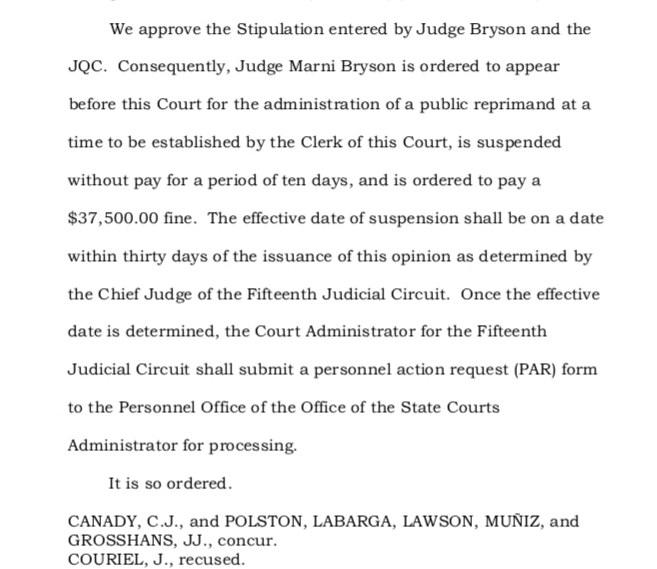
Florida Supreme Court Approves JQC Recommended Discipline
COMING SOON – Who’s running against Marni?


Florida Supreme Court Approves JQC Recommended Discipline
COMING SOON – Who’s running against Marni?
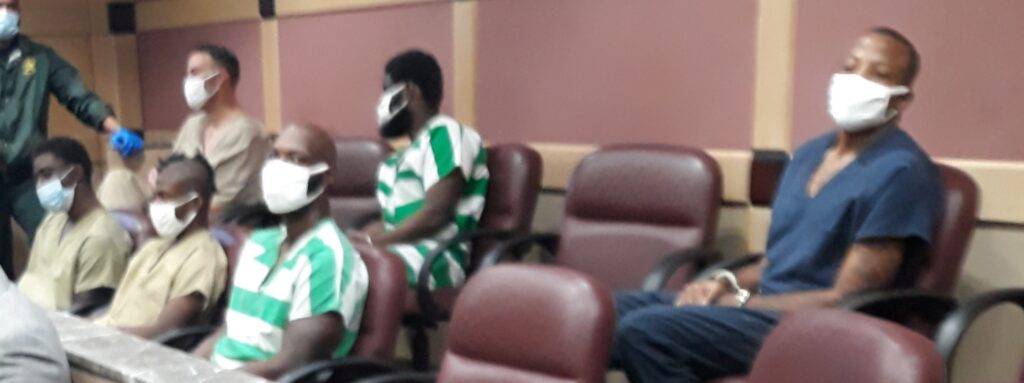
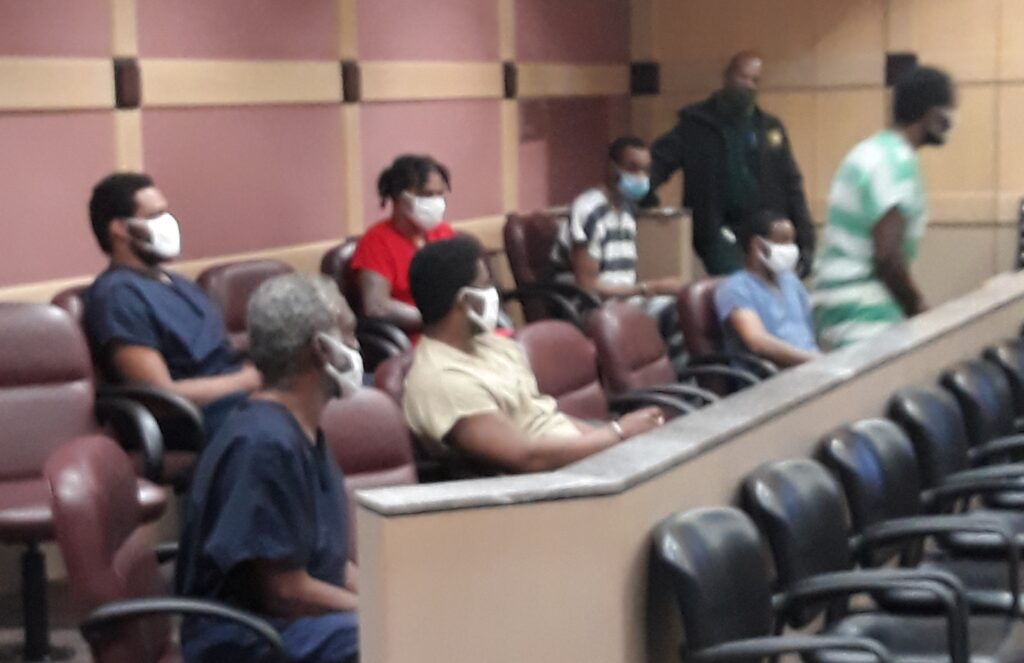
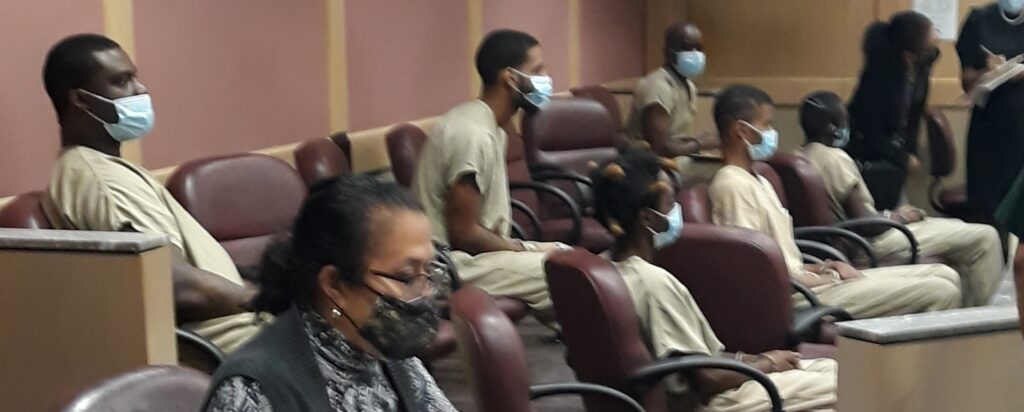
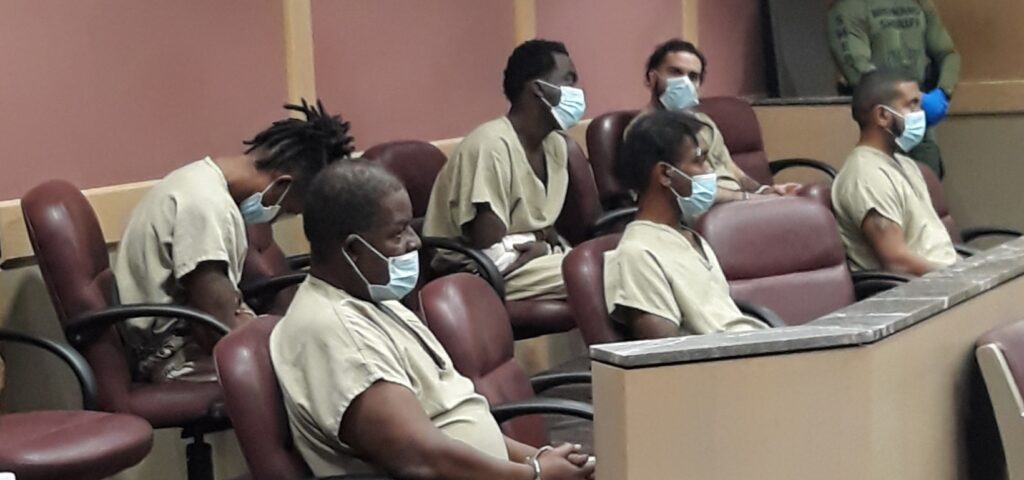

** (Social distancing and security protocols typically preclude more than six African-American inmates being brought to court at one time. All photos from Broward circuit court of recent vintage, more than representative of an average day in the 17th Judicial Circuit of Florida)
🎵🎵We’re talking heroin with the president, well it’s a problem, sir, but it can’t be bent 🎵🎵
___________________________________________________________________
COMING SOON – JAABLOG HAS A PROCLAMATION OF ITS OWN:
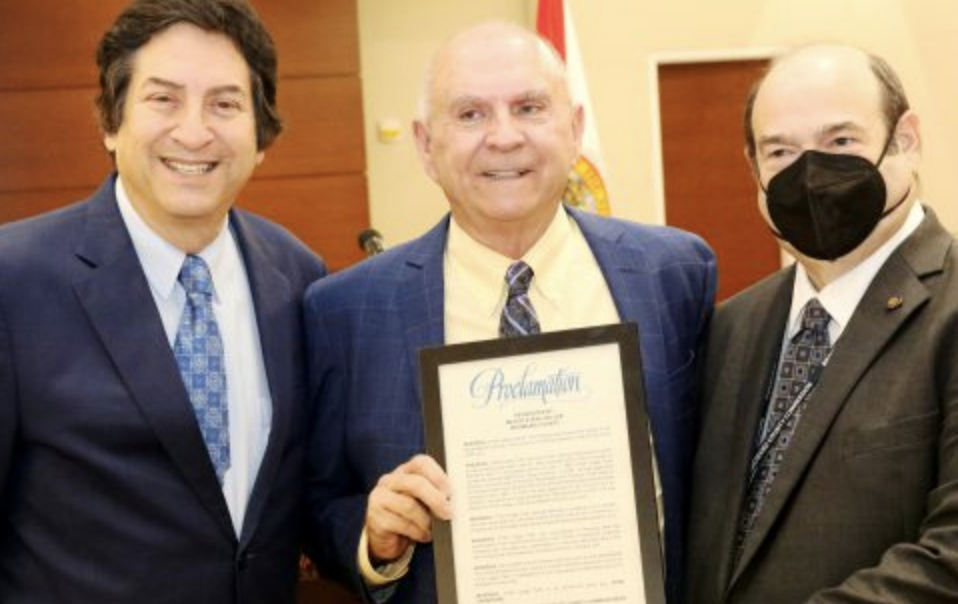
Jack Tuter’s plaquing is underway. The new 17th floor ceremonial courtroom is being dedicated in his name at this moment. It’s being live streamed here, and should remain available after being recorded.
JAABLOG was unceremoniously booted from the event shortly before it started. We were told the entire 17th floor is still closed to the public, and that the event is by invitation only, meaning our invitation wasn’t lost in the mail after all. We were also informed that press, mainstream or otherwise, was banned, and that the order for JAABLOG’s eviction came from Tuter himself.
Here are a few snaps we managed while in the process of being kicked out:

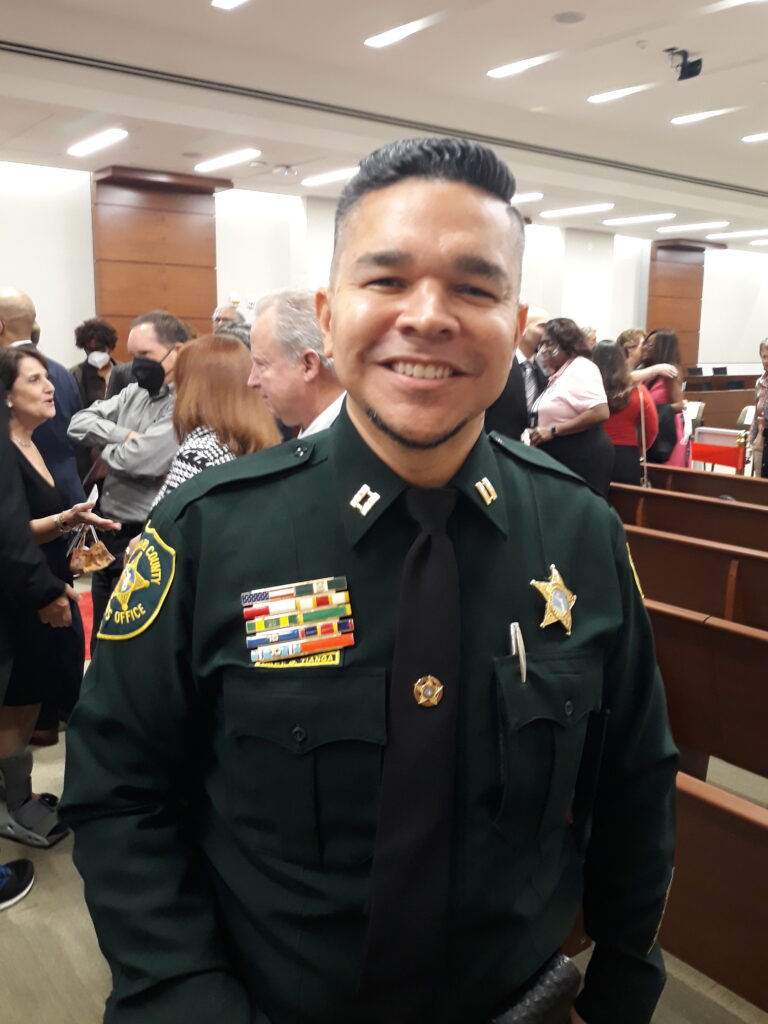


COMING SOON – MOVEMENT!
There’s a lot of head-scratching going on regarding new Florida Bar Rule 3-7.18, and more than a little anger in the criminal defense community. It’s not just lawyers either. Judges also aren’t happy, at least the kind that can control their courtrooms, and, more importantly, understand the sacred rights guaranteed the accused by the United States and Florida Constitutions.
Questions as to how such a poorly drafted rule could breeze through without more input from criminal practitioners and scholars abound. Of course, we’re all guilty of not reading The Florida Bar News, where the required notices were posted. It’s not something most people pay attention to in normal times, let alone during an unprecedented pandemic. After an initial lull in March of 2020, most lawyers will tell you they were doubled or tripled down for the duration with extreme workloads because of wildly fluctuating procedural changes and corresponding never-ending Zoom dockets and jail calls. The cries of the incarcerated were greatly amplified due to often unconscionable conditions, and criminal defense attorneys with good reputations were there to pick up the slack. It’s no wonder Rule 3-7.18 slipped through while everyone was distracted, but it doesn’t make it right.
The end result? We’re all now stuck with a rule that has the unbridled potential to short-circuit both the zealous defense and prosecution of the accused.
From an email from Jude Faccidomo, President of Florida Association of Criminal Defense Lawyers (FACDL):
FACDL respects and appreciates the need for the judiciary to make referrals where appropriate, but the process previously in place was thorough and more than sufficient. We are concerned that this rule will have a chilling effect on zealous advocacy. We all strive to maintain professionalism, but this is an adversarial system and can often lead to spirited litigation. The concern is that a lawyer, whether State or Defense, will potentially back off of their ethical obligation to advocate for their client for fear of offending the court.
Think about it. Is it beyond the realm of possibility that a lawyer, inexperienced or veteran, will, in the face of judicial displeasure, tacit or otherwise, curtail or alter cross-examination of a witness, or back off a controversial argument, out of fear of a career damaging complaint that could drag on literally for years? How about if the judge in question also has a known history of filing complaints against aggressive litigators? By way of another likely hypothetical, what if the judge is a proud former law enforcement professional, presiding over a matter with police misconduct alleged? And what if an aggressive prosecutor, with an open judicial referral or prior sanction, decides to hold back on prosecuting a violent habitual offender, out of fear of compounding issues with the Bar? Or if one counsel inappropriately egg’s on an inexperienced judge to lean on opposing counsel, thereby altering the outcome? Possible examples of the negative impacts of the new rule are unfortunately a law professor’s dream.
From a text by former Public Defender and current WSVN Legal Analyst Howard Finkelstein:
If this rule had been effect when I was a public defender we never could have pushed or tried to push the judiciary and the public to do the right thing about institutional racism, drug use and abuse and mental health. For a fact I have witnessed Broward judges abuse the disciplinary process to muzzle lawyers pointing out their wrongful behavior. With this rule change it is a guarantee they will abuse the process even more. And to trust the Florida Bar to stand up to an abusing judge is just foolish based on their weak kneed history. This rule is not about protecting the public from bad lawyers but rather protecting bad judges from being revealed to the public.
Is Rule 3-7.18, as Howard says, simply there to protect bad judges? It’s a question worth asking given the sheer volume of known JQC activity in Broward alone, and the influence of all judges, good or bad, already built into the discipline process. Factoring in contempt powers, which when implemented also draw Bar scrutiny, only strengthens Finkelstein’s assertion.
As reported by Florida Bulldog:
The Florida Bar News presented (Rule 3-7.18) as a response to unidentified judges who “have long complained” their referrals aren’t taken seriously enough.
In fact, Florida Bar records show that judicial referrals already command the lion’s share of attention. During the 2019-2020 fiscal year, out of 74 complaints from judges, 64 (86 percent) went to grievance committees. In the 2020-2021 fiscal year, which saw a 38 percent rise in these complaints, 81 out of 102 (79 percent) went to grievance committees.
In contrast, for the 2019-2020 fiscal year, out of 3,483 complaints from the general public, 228 (6.5 percent) made it to grievance committees. For the 2020-2021 fiscal year, the public submitted 3,262 complaints and 369 (11 percent) got to grievance committees.
The key to understanding Rule 3-7.18, and to remedy it, is to try and understand its genesis. According to the Florida Bar News, the rule was developed by the Special Committee on Judicial Referrals on Discipline Matters, co-chaired by board members/civil practitioners Paige Greenlee and Michael Fox Orr. According to Law360, the Special Committee was put together by former Bar President/civil practitioner Dori Foster-Morales, who, “during her tenure as president-elect, received feedback from judges that their referrals for attorney discipline were not being handled with enough deference.”
We reached out to Foster-Morales, but our call wasn’t returned. We also tried Michael Fox Orr, with no luck. Paige Greenlee was, however, kind enough to speak to us earlier today. While stressing she couldn’t say with any certainty, Paige stated her recollection was there wasn’t a lot of discussion or distinction drawn about the disparate impacts the new rule could have in the civil world versus the criminal world because “the rules apply equally” to all lawyers, and “in all instances.” Paige also echoed Law360** by saying she believed Foster-Morales had gotten the idea after traveling throughout the state and receiving comments from judges that their referrals were not being treated as seriously as they should.
So there you have it. The criminal world, as in most cases when the Florida Bar is concerned, has been pushed to the back of the line, where, once again, constitutional rights are at stake. It begs the question as to whether criminal practitioners, or courtroom lawyers who deal with judges daily, are properly represented on the Board of Governors or its committees. Whatever the answer may be, the fact remains there are immediate, serious problems to be addressed, and legal strategies involving Due Process and Equal Protection to be weighed for the protection of the accused, the general public, and attorneys.
From an email from Ben Kuehne:
The newly promulgated Florida Supreme Court approved Rule 3-7.18 is a game-changer for all lawyers who toil in the courts of Florida. Assigning special processing for review of judicial referrals against lawyers has the likelihood of chilling aggressive yet responsible lawyering in the face of judicial displeasure. Whether judicial referrals should be subject to a different form and standard of review from that applicable to every other possible complainant seems certain to invite challenges to the Rule. The Rule by its language appears to create a pseudo-presumption of correctness when a judge criticizes a lawyer’s conduct, and thereby subject lawyers to a more likely possibility of discipline …
_________________________________________________________________
** According to Law360: “Joseph Corsmeier, a Clearwater lawyer who used to prosecute attorney discipline cases before switching to defense, says he believes that if the rule is approved, Florida would be the only state to implement a process like this that gives more weight to the complaints of judges on attorney discipline matters.“
DEVELOPING …
COMING SOON – Does the Jaablog Play a Role in New Rule 3-7.18; Harold Pryor’s Fourth Quarter Report Card …

Great news for those interested in criminal justice reform came down from the Fourth DCA last week, courtesy of Austyn Sanders, Barbara Duffy, and former 17th Circuit drug court honcho Melanie May.
From STATE v. ROODY DHAITI, October 27, 2021, allowing multiple withholds for simple drug possession (and other non-violent charges) for chronic substance abusers:
A little bit of statutory construction and the rule of lenity are at issue in the State’s appeal of the defendant’s sentence. The State argues the trial court erred by withholding adjudication and placing the defendant on drug offender probation, pursuant to section 948.20(1), Florida Statutes (2019), because the defendant had previously received three prior withholds of adjudication. We disagree and affirm.
The State charged the defendant with possession of Alprazolam, a third-degree felony … The defendant pleaded no contest and moved for alternative sentencing under section 948.20, Florida Statutes (2019), the drug offender probation statute …
Section 948.20(1) allows the court to withhold adjudication and place a defendant on drug offender probation if “the defendant is a chronic substance abuser whose criminal conduct is a violation of s. 893.13(2)(a)
or (6)(a) [prohibiting the purchase or possession of certain controlled substances], or other nonviolent felony.” § 948.20(1), Fla. Stat. (2019). That statute specifically provides: “the court may also stay and withhold
the imposition of sentence and place the defendant on drug offender probation or into a postadjudicatory treatment-based drug court program if the defendant otherwise qualifies.” …
Here too, allowing the trial court to withhold and impose drug offender probation is consistent with strong policy considerations that treatment is the most effective way to rehabilitate a chronic substance abuser like the defendant. Section 948.20’s specific provision covering drug offender probation controls over the general provisions of section 775.08435. And, section 948.20 was enacted after section 775.08435, expressing the latest in legislative intent … (emphasis added)
WELL DONE!